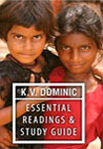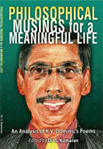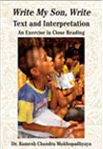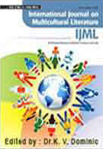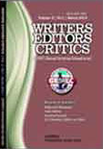Books Review in Detail
Review Of Aju Mukhopadhyay’s Review of K. V. Dominic’s Poems
Social Criticism, Empathy and Love of Nature in K. V. Dominic’s Poetry
Social Criticism, Empathy and Love of Nature in
K. V. Dominic’s Poetry
Aju Mukhopadhyay
Â
    Buddha and Christ and Gandhi along with many others like Mother Teresa suffered for the same cause and prescribed or tried out some remedy. They variously preached and acted so that mankind may get solace, may be able to avoid such fate. If Gandhi’s pity for the poor or Vivekananda’s revolt for the misery of his people or Christ’s serving the leapers, all tell us the tale of weeping of the heart for the sufferings of the others. Many Indians have a very soft heart. Alas! They can never be terrorists. And it is true that poets among all humans are usually sympathetic to the human suffering in general and unjust blows of the brutes in society to the undeserving persons in particular. Inwardly they weep, sometimes revolt but mostly express themselves through their poetic medium. Among the contemporary poets I find D. C. Chambial often resorts to such actions through his poetry. K. V. Dominic has a conspicuous place among such poets.
Like many Indian poets and writers serving the Goddess of Literature, Dr. K. V. Dominic too is a professor of English who retired from a college in Kerala in March 2011. He is the Secretary of Guild of Indian English Writers, Editors and Critics (GIEWEC) and editor of three international refereed journals, Writers Editors Critics (WEC), International Journal on Multicultural Literature (IJML) and New Fiction Journal (NFJ). He published his first volume of poetry, Winged Reason in 2010 through Authorspress, New Delhi and his second book of poems, Write Son, Write came out from GNOSIS, New Delhi in 2011. Almost all his poems tell us that he never writes to express sheer beauty, passion for possession, spiritual aspiration or aesthetic pleasure. He is a realist with deep social feelings. Sufferings of any kind inflicted either by fate or man on man or animal make his heart bleed; loss of freedom suffocates him. With an empathic heart he often sustains wounds at others’ sufferings. But at some rare moments the nature lover in him appreciates nature’s beauty and coming out, he peeps into a Cuckoo’s nest.
Â
Keeping both his books before me, I may give examples of what I have just said before.
A hawk experiences the incongruities of human nature, injustices and unsympathetic attitude of men towards men while hovering over human society. It is just not a bird’s eye view but a minute observation of the one who empathise with others. The bird concludes as if in a parable,
                                      Tears streamed down my cheeks.
                                     I could see nothing more;
                                     nor did I wish for it;
                                   The siren sounded as usual
                                    to disturb my nightmare!
                                     (“A Nightmare,â€Â Winged Reason 23)
    The revolting poet tells, as if it is an irony of his fate, not to be able to do as he wishes,
I wish I were a bullet
and shoot into the chest of that terrorist
who compels that teenage boy
to explode and kill that innocent mob.
(“A Blissful Voyage,â€Â Winged Reason 21)
The tree tells God about man, as if in a parable-
This planet would be a paradise
if you kindly withdraw him
(“I am just a Mango Tree,â€Â Winged Reason 24)
In a dialogue with a man a sheep wails,
Man, you are the cruelest
you are the most ungrateful
of all God’s creations.
(“A sheep’s Wail,â€Â Winged Reason 25)
And the poet wails in “Cuckoo Singingâ€
Yes, cuckoo lives
singing and loving,
while man exists
sweating and moaning
(Winged Reason 30)
Neglected, spastic child and child under the tutelage of a cruel man create pathetic scenes as we find in such poems as “Anand’s Lot,†“What a Birth!â€, “Rahul’s World†and “Vrindaâ€â€“all in Winged Reason.
“Hunger’s Call†tells us a horrendous story of famished humans consuming a big elephant carcass in 90 minutes at Zimbabwe (Write Son, Write 66).
In “For the Prophet†highly praising Resiya as an ideal lady, an embodiment of piety, he compares her to some others of her community who commit beastly act-
Resiya’s own State witnessed another act:
religious extremists hacked off
a professor’s right palm
and cut his legs to slaughter him.
And they did this to please the Prophet!
(Write Son, Write 62)
The same theme recurred in “To my Colleagueâ€â€“in the same book as the professor who was the victim is this poet’s colleague in the same college, punished for using a particular name which may be the name of many others. The poet laments-
Where is freedom of speech
and expression?
India, my motherland.
(Write Son, Write 84)
The poet feels pity for the old age, in “Old Age.†He tells us how once experiencing the death struggle of a fish caught he resolved never to go for angling and eventually became a vegetarian, in “My Teenage Hobby.†Injustice affects him. He writes:
Unfortunate crow feeds cuckoo’s chicks;
yet crow is not lauded
and cuckoo is extolled
(“Crow, the Black Beauty,â€Â Write Son, Write 57)
The poet is in fact a cat lover. I can easily feel his pulse through my own love for them. He writes:
Poppy, my dearest kitten;
God gave me through my friend.
Manifestation of Him in her face;
. . . . . . . . . . . . . . . .
My affection to Poppy
no less than to my wife,
daughter and son.
What difference is there
between men and animals?
For He resides in all.
(“Attachment,â€Â Write Son, Write 51)
His pet, a lovely cat Ammini, was poisoned to death causing misery to the family. Two
poems on it are full of love and pathos. The poet yells about men:
Inhumane to animals,
they do believe,
all creatures are for men,
(“Ammini’s Lament,â€Â Winged Reason 62)
It is an irony of fate, as the poet writes,
Thousands of fiends
inhabit this planet,
turning the earth
to a big slaughter house,
as if man alone has
the right to live here.
(“Ammini’s Demise,â€Â Winged Reason 64)
Rarely he comes to politics but once in a poem titled, “Indian Democracy†he rightly says:
The real issue of the country
never discussed among people.
Election campaigns:
freworks of lies and abuses.
. . . . . . . . . . . . . . . . . . .
Thus democracy reigns
drinking tears of thousands!
Criminal MPs,
brought from jails
to prove majority on floor;
horse-trade of billions!
And he adds, aptly,
Gullible people,
they vote them again and again;
no other options.
(“Indian Democracy,â€Â Winged Reason 60-61)
In “Rocketing Growth of India†he sarcastically writes,
Rocketing growth of the rich;
express growth of the poor;
multifold growth of their gap.
(Write Son, Write 77-78)
It is a predicament to be a man, as the God who created him confesses-
I breathed in him
celestial values:
happiness, beauty,
peace, love, mercy;
but he fosters
hate and violence;
(“Write, My Son, Write,â€Â Write Son, Write 28)
In this muddy water the poet did not forget to pay great respect to his beloved Chief   Minister of Kerala when he passed away, writing among other things,
a rare species,
compassion and love
an epitome of Socialism.
(“Long Live E. K. Nayanar,â€Â Winged Reason 19-20)
So he wishes with utmost benevolence:
Let Suu Kyi fly over Myanmar
shower rays of freedom;
(“Aung San Suu Kyi—Asia’s Lady Mandela,â€Â Write Son, Write 53)
So he writes praising Sister Mercy and Mother Teresa. He writes on environment on occasions like Water Day, as in “Water, Water Everywhere†(Write Son, Write 91-92). Among all these, sometimes taking solace in the heart of Nature, the poet takes rest in Nature’s lap as in a bunch of haiku-like triplets titled “Nature’s Bounties†(Winged Reason 49-50).
K. V. Dominic, a born Christian, brought up in Kerala, though writes his poems in English, the subjects and thought process in his poems are absolutely, as in the case of most other Indian English poets, Indian; often he refers to names of age old Indian deities, referring to episodes from the epic Mahabharata or from some folk tales. He carries the Indian tradition in his blood. After all, what is in India’s age old religion, called Hindu, is not just a religion but a way of life and a culture which saturates all Indians. Dominic is one of the latest Indian English Poets.
Works Cited
Dominic, K. V. Winged Reason. New Delhi: Authorspress, 2010. Print.
—. Write Son, Write. New Delhi: GNOSIS, 2011. Print.
Â
Â
Aju Mukhopadhyay, poet, author and critic, is a bilingual writer of fiction and essays. He has authored 28 books and received several poetry awards besides other honours. His works have been recognized by various national and international institutions. Many of his works have been translated into other languages and anthologised. He is a regular contributor to various magazines and ezines in India and elsewhere. Conservation of Nature and Environment is the watchword of his life.

